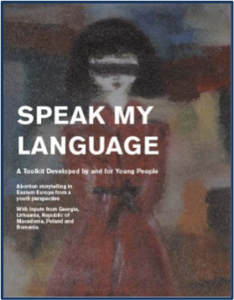This is web-based toolkit was developed by and for young people with inputs from Georgia, Lithuania, Republic of Macedonia, Poland and Romania, and written and edited by YouAct with great input from ASTRA Youth. The publication opens:
Dear Reader, This toolkit has been created for you.For the young woman who is choosing to get an abortion: you are not alone, your body is yours, and you are the only one who gets to decide what is best for you.If you need help, ask for it. It’s okay to talk about your abortion.For the healthcare provider: abortions are a delicate topic and the young woman is sensitive, so be cautious of what you say and try to be as supportive as you can be.For the friend, relative, teacher, or peer of someone who will have, or has had an abortion: respond with compassion and without judgement.For the pro-choice advocates: your voice is being heard.To everyone who is reading this right now – we hope this book provides you with the information and guidance on how to talk about abortions, and how to break the stigma.
 YouAct, the European Youth Network for Sexual and Reproductive Rights, is run largely by volunteers, most of whom, they say: “dedicate their professional, academic and personal lives – to sexual health and rights. We come from different European backgrounds; and yet we share many dreams, principles and a commitment to give sexuality the place it deserves in our lives and communities.Why abortion stigma? We believe it is imperative to consider abortion stigma as a critical issue for youth. We recognise the importance of considering the most human aspects of abortion. There is much more than just abortion rights and health factors. Abortion is a social reality, a cultural phenomenon, and a human experience. Abortion stigma is a social and cultural event which can lead to social, medical and legal ramifications. The consequences raised by abortion stigma are placed within a context where social norms, health and social policies, and community practices play strong roles on the development of abortion experiences (For more on abortion stigma, see http://www.endabortionstigma.org).Why Eastern Europe? Since the collapse of communism, Eastern Europe has witnessed a number of transformations, especially on political and economic levels. Despite progress in the form of economic development and empowerment of civil society as one of the effective mechanisms calling for the accountability of authorities, there are still grey areas to be addressed. The region has to struggle with growing inequalities, social injustice, discrimination, corruption, religious fundamentalism and patriarchal structures. This situation is reflected in a number of fields, including sexual and reproductive health and rights. Why this toolkit? We believe sharing these experiences can empower youth to create a different human reality by eliminating abortion stigma. Stories have a power of their own – telling and sharing them, can help us develop profoundly, as well as give people the chance to see what abortion stigma can mean to others.With this toolkit, we aim to provide organisations, professionals, individuals, and especially youth with a framework to develop their own strategies to use storytelling to draw out the voices from our bodies*, learn to speak a language through which we can satisfactorily communicate abortion stigma, and provide others with the tools to learn to speak our language.FULL TEXT: YouAct
YouAct, the European Youth Network for Sexual and Reproductive Rights, is run largely by volunteers, most of whom, they say: “dedicate their professional, academic and personal lives – to sexual health and rights. We come from different European backgrounds; and yet we share many dreams, principles and a commitment to give sexuality the place it deserves in our lives and communities.Why abortion stigma? We believe it is imperative to consider abortion stigma as a critical issue for youth. We recognise the importance of considering the most human aspects of abortion. There is much more than just abortion rights and health factors. Abortion is a social reality, a cultural phenomenon, and a human experience. Abortion stigma is a social and cultural event which can lead to social, medical and legal ramifications. The consequences raised by abortion stigma are placed within a context where social norms, health and social policies, and community practices play strong roles on the development of abortion experiences (For more on abortion stigma, see http://www.endabortionstigma.org).Why Eastern Europe? Since the collapse of communism, Eastern Europe has witnessed a number of transformations, especially on political and economic levels. Despite progress in the form of economic development and empowerment of civil society as one of the effective mechanisms calling for the accountability of authorities, there are still grey areas to be addressed. The region has to struggle with growing inequalities, social injustice, discrimination, corruption, religious fundamentalism and patriarchal structures. This situation is reflected in a number of fields, including sexual and reproductive health and rights. Why this toolkit? We believe sharing these experiences can empower youth to create a different human reality by eliminating abortion stigma. Stories have a power of their own – telling and sharing them, can help us develop profoundly, as well as give people the chance to see what abortion stigma can mean to others.With this toolkit, we aim to provide organisations, professionals, individuals, and especially youth with a framework to develop their own strategies to use storytelling to draw out the voices from our bodies*, learn to speak a language through which we can satisfactorily communicate abortion stigma, and provide others with the tools to learn to speak our language.FULL TEXT: YouAct



